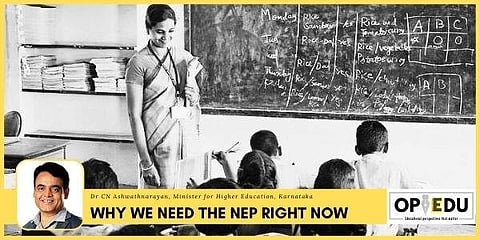

With the new National Education Policy (NEP), the higher education ecosystem in India is looking at a transition in two major ways - the way things are taught and learnt. Higher educational institutions have been rapidly accepting the proliferation of digital tools and technology platforms that have streamlined not just the academic aspects, but also the experiential and administrative functions too.
Under the NEP 2020, curriculum flexibility has been designed around adaptability and accessibility of the curriculum to students' needs and capabilities. A primary qualitative change that the policy wants to bring is the integration of multidisciplinary and vocational education in undergraduate (UG) programmes. All UG programmes, be it professional, technical and vocational streams, shall be more holistic. This kind of approach develops students into thinkers — critical, confident, and independent; and aims to make learning a process of self-improvement.
As part of the holistic nature of the new curriculum, students at all higher education institutes will be provided with opportunities for internships with local industry, as well as being encouraged to pursue research internships with researchers, so that students may actively engage with the practical side of their learning and, as a result, further improve their employability.
The four-year UG Programmes with multiple entries and exit options will have far more autonomy than before to decide what kind of major and minor subjects they want to take and how they want to combine their subjects with learning the best way for their career choice. It will also allow students to study while working and decide what skills or topics they need to learn. Higher Education Institutions (HEI) and their faculty will have the autonomy to innovate in curriculum, pedagogy, and assessment within a broad framework. The emphasis will be on a continuous and comprehensive evaluation. Respective institution’s assessment criteria shall be prepared with a criterion-based grading system; high-quality support centres, professional academic, and career counselling for all to be provided by each HEI.
The policy aims that by 2025, at least 50% of the learners across schools and higher education systems would have exposure to vocational education. In this regard, the policy notes the need to effectively integrate vocational education into mainstream education across all educational institutions in a phased manner. It will use various measures, like facilitating collaboration with local industries, establishing incubation centres or skill labs, and short-term certificate courses. There must be an incubation centre and various student clubs related to extra-curricular activities in every University or HEI.
The future of Higher Education Institutions in India will depend on careful integration of multiple disciplines that can generate new solutions for the common man's problems. The government at the centre as well as states are enabling HEIs to follow this new path of multidisciplinary growth through appropriate support.
Inter-disciplinary and multidisciplinary research programmes can solve the culture of problem-solving involving knowledge from all possible domains. It will also provide an impetus to every HEI's mission of producing professionals with multi-dimensional personalities who can play critical roles in nation-building, nurture the new culture of innovation, and make India self-reliant.
Dr Ashwathnarayan CN is currently Karnataka's Minister of Higher Education and the man who launched Karnataka's initiative to be the first state in India to adopt the NEP. Views expressed here are his own
